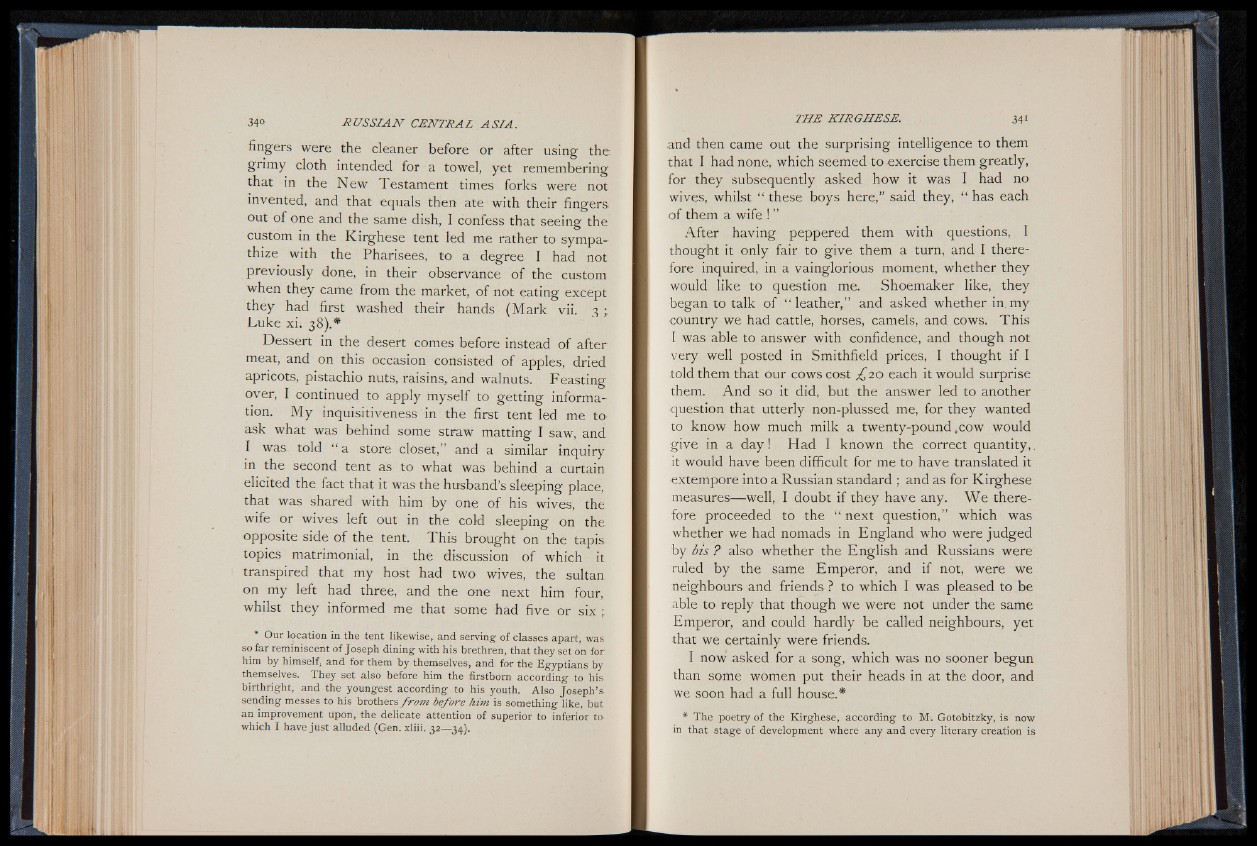
fingers were the cleaner before or after using the
grimy cloth intended for a towel, yet remembering
that in the New Testament times forks were not
invented, and that equals then ate with their fingers
out of one and the same dish, I confess that seeing the
custom in the Kirghese tent led me rather to sympathize
with the Pharisees, to a degree I had not
previously done, in their observance of the custom
when they came from the market, of not eating except
they had first washed their hands (Mark vii. 3 ;
Luke xi. 38).*
Dessert in the desert comes before instead of after
meat, and on this occasion consisted of apples, dried
apricots, pistachio nuts, raisins, and walnuts. Feasting
over, I continued to apply myself to getting information.
My inquisitiveness in the first tent led me to
ask what was behind some straw matting I saw, and
I was- told “ a store closet,” and a similar inquiry
in the second tent as to what was behind a curtain
elicited the fact that it was the husband’s sleeping place,
that was shared with him by one of his wives, the
wife or wives left out in the cold sleeping on the
opposite side of the tent. This brought on the tapis
topics matrimonial, in the discussion of which it
transpired that my host had two wives, the sultan
on my left had three, and the one next him four,
whilst they informed me that some had five or six ;
* Our location in the tent likewise, and serving of classes apart, was
so far reminiscent of Joseph dining with his brethren, that they set on for
him by himself, and for them by themselves, and for the Egyptians by
themselves. They set also before him the firstborn according to his
birthright, and the youngest according to his youth. Also Joseph’s
sending messes to his brothers from before him is something like, but
an improvement upon, the delicate attention of superior to inferior to
which I have just alluded (Gen. xliii. 32— 34).
and then came out the surprising intelligence to them
that I had none, which seemed to exercise them greatly,
for they subsequently asked how it was I had no
wives, whilst “ these boys here,” said they, “ has each
o f them a wife ! ”
After having peppered them with questions, I
thought it only fair to give them a turn, and I therefore
inquired, in a vainglorious moment, whether they
would like to question me. Shoemaker like, they
began to talk of “ leather,” and asked whether in.my
■country we had cattle, horses, camels, and cows. This
I was able to answer with confidence, and though not
very well posted in Smithfield prices, I thought if I
told them that our cows cost £20 each it would surprise
them. And so it did, but the answer led to another
question that utterly non-plussed me, for they wanted
to know how much milk a twenty-pound, cow would
give in a day! Had I known the correct quantity,,
it would have been difficult for me to have translated it
extempore into a Russian standard ; and as for Kirghese
measures— well, I doubt if they have any. We therefore
proceeded to the “ next question,” which was
whether we had nomads in England who were judged
by bis ? also whether the English and Russians were
ruled by the same Emperor, and if not, were we
neighbours and friends ? to which I was pleased to be
able to reply that though we were not under the same
Emperor, and could hardly be called neighbours, yet
that we certainly were friends.
I now1 asked for a song, which was no sooner begun
than some women put their heads in at the door, and
we soon had a full house.*
* The poetry of the Kirghese, according to M. Gotobitzky, is now
in that stage of development where any and every literary creation is